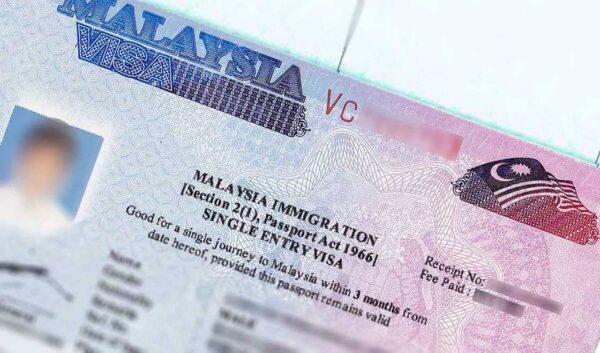Do you want to take a trip to the land of opportunities? To make your American dream come true, it is important for you to understand the requirements for U.S. immigration. The procedure can be complex, but don't worry! Nevertheless, we will simplify the conditions and give clear directions to help you reach your goals. Starting from visa options to eligibility standards, we will put everything in simple terms that guarantee a smooth and successful journey toward residing or acquiring citizenship in the U.S.A. Now, let's begin your immigration journey with visa types. You should also check ways to Immigrate to the United States.
US Immigration Visas
The rates of immigration are higher yearly in the US, so one needs to know the US immigration requirements before going into it. You require a visa to enter the country, whether you intend to stay permanently or temporarily. If you intend to visit the country, you can get nonimmigrant visas. However, if you want to live in the United States permanently, you must obtain an immigrant visa. Obtaining an immigrant visa to the United States will offer you permanent residency.
You will not be forced to leave and return home once you enter the nation on an immigrant visa. You can work and apply for permanent residence in the country. So, one of the immigration process is to get your immigrant visa. You don't need to extend or renew your immigrant visa once you have one. Your immigrant visa will remain valid indefinitely as long as you don't do anything unlawful or have any criminal record while in the U.S.
Types of Immigration Visas
One of US immigration requirements is to get your immigration visa. The different types of immigrant visas to the United States can be obtained through work, adoption, family ties, special immigrant categories, and diversity visas. You’ll find out your immigration status after getting one of these visas. Let's find out more details about each visa category.
1. Family-Based Immigration Visa
An immigrant visa (IV) is necessary for a foreign national who wants to reside permanently in the U.S. However, it has its eligibility requirements. For the family-based immigrant visa, you must be sponsored by an immediate family member who is a permanent resident or U.S. citizen. Also, it has to be an eligible family member. The relative has to be at least 21 years old. The immigration process is quite easy. Visas for family-based immigration fall into two categories:
Immediate Relative – The foundation for these family-based visas is a close familial connection to a citizen of the United States, such as a spouse, parent, or child.
Family Preference: These family-based visas are intended for certain, further-reaching familial links with citizens of the United States and certain types of relationships with Lawful Permanent Residents (LPRs).
2. Employment-Based Immigration Visas
Getting an employment-based visa can be among the US immigration requirements for relocating. You may be able to apply for an employment-based immigrant visa and become a permanent resident of the United States if you meet the requirements in terms of education, training, and/or job experience. So it’s like an employer sponsor for you. Moreover, there are easy ways to get permanent residence in US. For the most part, these visas require that the employer make an offer of employment that already exists and that it does not displace a U.S. citizen. This is done by certifying that the U.S. Department of Labor properly licenses the employer and that there are not enough people in the country with the necessary skill set. There are five preference categories of employment-based visas.
EB-1 Visas
People with extraordinary ability or exceptional abilities are covered by EB-1, including businesspeople, scholars, researchers, scientists, artists, outstanding professors, and athletes. Labor certification is optional for this kind of visa. If an EB-1 visa holder's family member has an accepted I-140 (green card) form, they may seek entry to the United States on an E-14 or E-15 immigrant status, respectively.
EB-2 Visas
EB-2 visas are accessible to professionals with an advanced degree or foreign equivalent who can show at least ten years of expertise in a field or whose work is in the national interest of the United States. If the beneficiary of an EB-2 visa has an accepted I-140 (green card) form, their family members may petition for entry to the United States using E21 or E22 forms.
EB-3 Visas
Both skilled and unskilled laborers with a non-temporary job offer from a U.S. business and those with a bachelor's degree or equivalent from a foreign country are eligible for EB-3 visas. Yes, it doesn’t matter if they are unskilled workers. It should also be noted that they’re not temporary workers. Labor certification is required for each EB-3 eligibility category. Family members of EB-3 visa holders may petition for admission to the United States using the specific citizen spouse or kid forms, provided they have an approved I-140 (green card) form.
EB-4 Visas
Specialized visas, known as EB-4s, are available to specific religious workers, U.S. foreign service personnel, retired personnel of international organizations, and noncitizen youth who are wards of U.S. courts, among other groups. This kind of visa does not require labor certification. Certain families might qualify for entry.
EB-5 Visas
The Immigrant Investor Program is covered by EB-5 green cards. These can be obtained by investors who spend either 1.8 million USD in a new business venture with at least ten full-time U.S. employees or 900,000 USD in a new business venture in a designated employment region with at least ten full-time U.S. employees. This kind of visa does not require labor certification. Investors and their families may apply for green cards under this program.
3. Adoption Based Visa
As an adopted child, one of US immigration requirements is to get an adoption visa. Adopted children from overseas must first obtain a U.S. visa to visit or relocate to the country. The American Embassy or Consulate in the foreign country or country of nationality where a child resides is where visas are issued. A kid adopted overseas by a parent or parents who are citizens of the United States will typically be brought to live in the country; hence, the adopted child will require an immigrant visa.
The U.S. Immigration and Nationality Act (INA) must be applied for in order for adopted minor children to be allowed to immigrate and live in the country. Adoption rules differ between nations. Therefore, it is occasionally feasible to adopt a child from overseas who is not eligible for immigration under U.S. law; these minor children are not permitted to immigrate to the United States.
According to the INA, a child who is adopted overseas while still under the age of sixteen and who has lived with their adoptive parent(s) may be eligible to receive an immigrant visa under the IR-2 category. The immigration process is not relatively difficult.
4. Diversity Lottery Visa
Every year, the U.S. conducts a “green card lottery” in which up to 50,000 immigrant visas are randomly awarded. If you’re chosen, then you’ve become one of the green card holders. The only nations from which applicants may apply are those with low immigration rates to the United States. The immigration process here is not complicated.
US Immigration Requirements
For most US immigration applications or permanent residency requirements, you must pass:
- A background check, during which you might be required to provide police reports from previous residences and respond to inquiries on prior offences.
- A medical examination, in which inquiries concerning your history of communicable diseases, drug and alcohol use, and mental health will be made.
US Visa Requirements
To apply for a U.S. visa, you must have the following documents.
1. A nonimmigrant DS-160 application form.
2. A valid passport – It needs to be valid for at least half of the time you intend to spend in the country. On the other hand, certain nations are excluded from this rule and just require a valid passport for the duration of their visit to the US. Your passport must have at least one blank page to attach your visa.
3. Your Photograph – When submitting your online application using the DS-160 form, upload your photo. You can turn in the photo on the appointment day if the upload doesn't work. We urge you to bring the photo to the visa interview, though, just in case.
4. Proof of payment of $185 for the nonimmigrant US visa application.
5. Social Media Details – A list of all the social media platforms you use, your account name, phone number, email address, and the last five years of social media activity data. After this, you can start your visa application.
Sponsorship Documents
You will need to provide documentation if you intend to enter the country under the sponsorship of another US citizen. The sponsor needs to provide these records:
- Affidavit Letter: This document attests to the sponsor's ability to provide for your financial needs throughout your stay.
- Employment letter: this document verifies the sponsor's employment and details his pay.
- Three or four payslips
- Bank Letter, which lists the dates the account was opened, plus the total amount deposited during the previous year and the current balance.
Employment Documents
- Bring a letter from your employer detailing your job title, pay, length of service, and allotted vacation time. And if you are employed, the reason for your journey to the US.
- If you're retired, you'll need a pension book.
- Details of income, if self-employed, and the company registration certificate.
Family Documents
Documents such as birth certificates, marriage certificates, pictures of close relatives, adoption certificates (if you were adopted yourself or have adopted a kid), divorce certificates, death certificates from your spouse, etc.
Cost of Immigration Visa
US immigration requirements also come with a cost. The entire cost of filing for a family-based green card is roughly $1540 for applicants residing overseas or $3005 for those living in the United States. This covers the usual cost of the necessary medical examination and mandated, nonrefundable U.S. government fees.
Furthermore, the entire expense of applying for a U.S green card based on employment varies according to the category you're applying under. The average cost of a green card application is $2330. However, your business may have to pay extra for labor certification and filing fees. This brings the total cost up to over $10,000. It is crucial to submit your visa application accurately the first time around because your filing fees are nonrefundable in any scenario. After that, you can start monitoring your immigration status. The visa type determines the processing time. The visa processing time could be three weeks to five weeks.
Conclusion
Navigating U.S. immigration requirements is a journey worth taking. With the right guidance, you can overcome the hurdles and achieve your dreams in the land of opportunity. Embrace the process, stay informed, and make your American aspirations a reality!
















